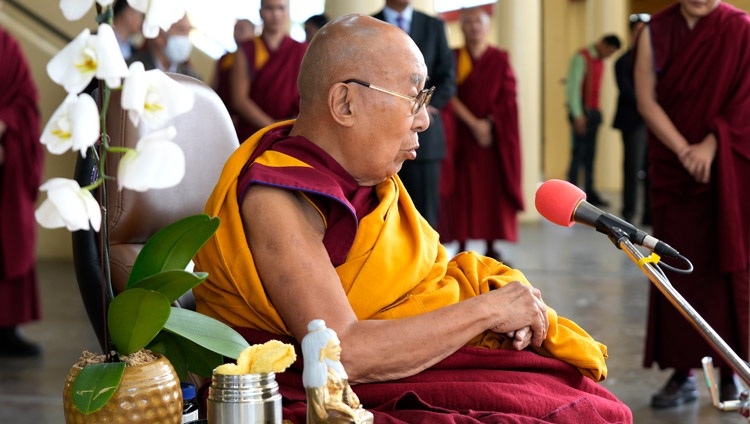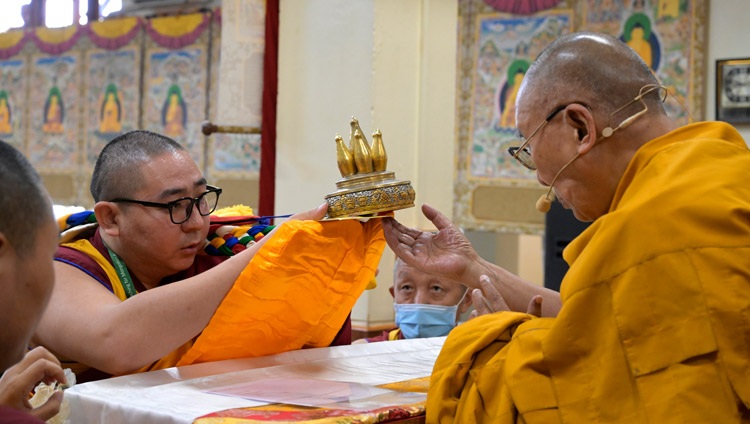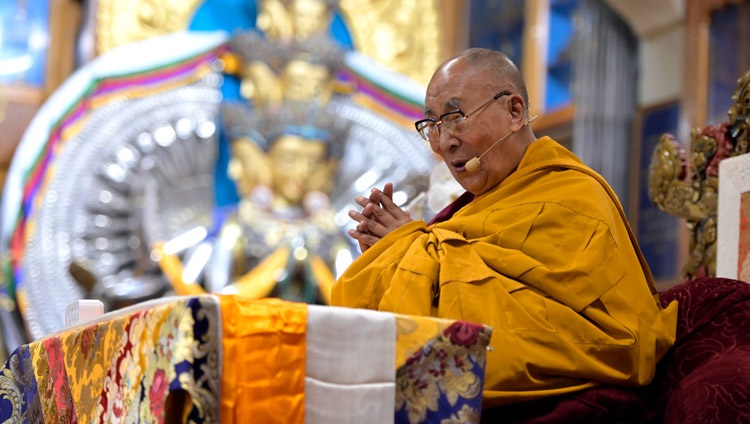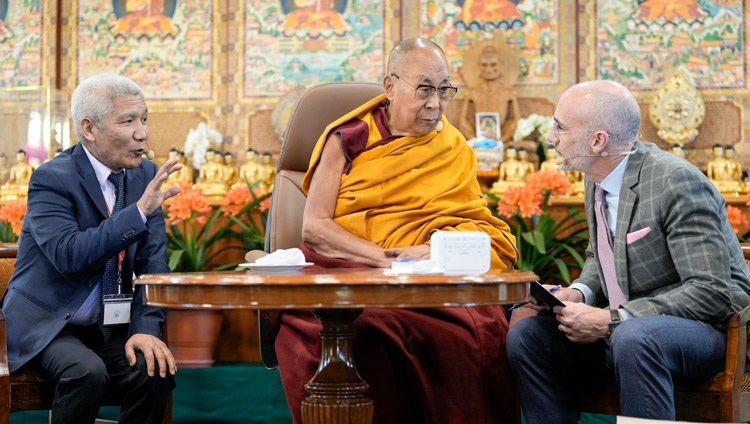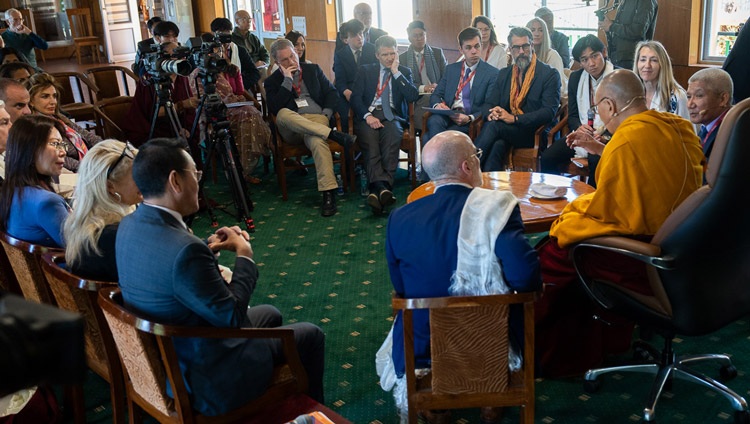Commentary on the Awakening Mind – Second Day
November 6, 2020
Thekchen Chöling, Dharamsala, HP, India – Today, Telo Rinpoché welcomed His Holiness the Dalai Lama and opened the session by reminding him that he last visited Tuva in 1992. He mentioned that this year the Tuva Sangha lost their spiritual leader, the Khamby Lama, Ven Jamphel Lodoi to the Coronavirus. Rinpoché offered condolences to the people of Tuva. A new Khamby Lama, Ven Gelek Natsyk Dorjuu, was elected on 4th October. Telo Rinpoché congratulated him on his appointment and offered prayers for his good health and success.
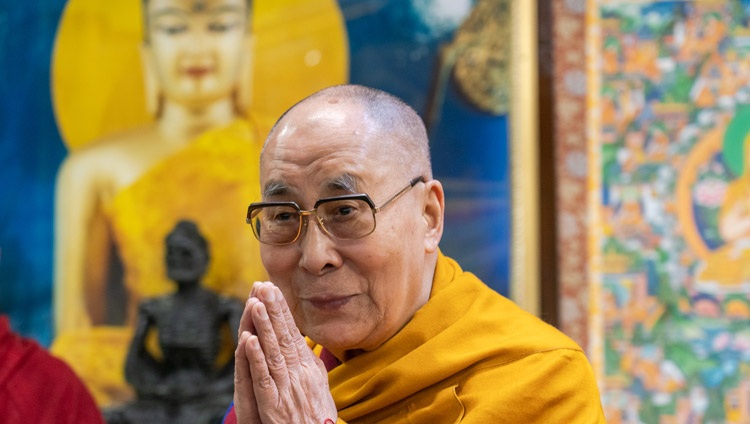
There followed a recitation of the ‘Heart Sutra’ in the Tuvan language from Tsechenling Khuree in Tuva.
His Holiness began by announcing that since tomorrow, the third day of this series of teachings, is regarded as an auspicious day, he would conduct a ceremony for generating the awakening mind of bodhichitta. The occasion is the commemoration of the Buddha Shakyamuni’s descent from the Heaven of Thirty-three, where he had gone to visit his late mother.
“Nevertheless,” he remarked, “we don’t need to demonstrate the unique qualities of the Buddha’s teachings on the basis of miracles, nor solely in terms of faith. The Buddha was a philosopher and the Nalanda masters verified his teachings on the basis of reason.
“Today, we face an array of problems because our minds are undisciplined. The Nalanda masters recommended first examining what disturbs the mind and then considering what counters those disturbances. The basic nature of the mind is clarity and awareness, but the disturbances and defilements are adventitious.
“We’ve been reading the ‘Commentary on the Awakening Mind’ by Nagarjuna who is known as a second Buddha. In this text we find a rejection of the assertions of non-Buddhist schools and then of the views of the Mind Only School.
“The second and third rounds of the Buddha’s teachings are the most important. What he taught in the first round lays the foundation for the later teachings. He explained that the mental defilements that are the origin of suffering are not actually of the nature of the mind, but can be eliminated.
“Non-Buddhists accept a single, autonomous self, the ‘atman’, that is separate from the psycho-physical aggregates. I find this idea convenient when it comes to explaining the existence of past and future lives. However, Nagarjuna rejects the notion of a separate self as unacceptable.
“The Buddha taught in terms of the way things appear to us. Some disciples had a propensity for the Mind Only view. This rejects external existence and regards things as a mere reflection of the mind. They assert that sound, form and so forth exist, but not separately from the mind. They appear as a result of the ripening of imprints on the mind. The notion that there are no external objects has the effect of loosening our sense of attachment and so forth. However, where the Mind Only School says that things are a mere reflection of the mind, the Middle Way view is that things are merely designated by the mind. The purpose of this assertion is to disrupt the misconception that things have true existence.
“Followers of the Autonomous Middle Way School accept the objective existence of things, while the Consequentialist view, propounded by Nagarjuna and reiterated by Chandrakirti, rejects any objective existence of things. Things exist, but they do not exist in the way they appear.
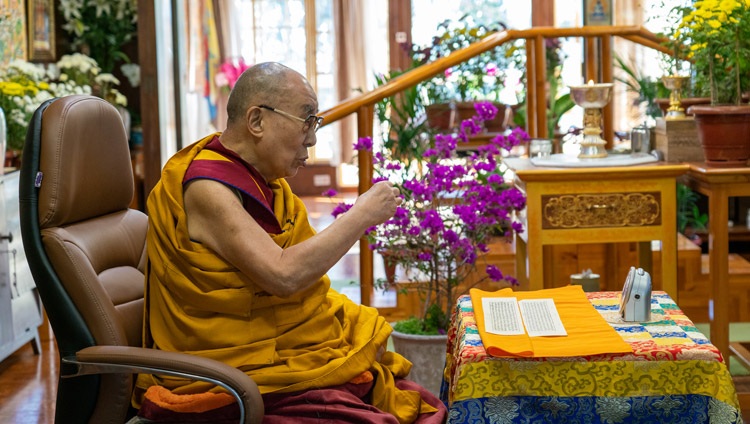
“Things have no essential core in and of themselves. Chandrakirti explains that things having objective existence would entail four logical fallacies: that the Arya being’s meditative absorption on emptiness would be the destroyer of phenomena; that it would be wrong to teach that things lack ultimate existence; that the conventional existence of things would be able to withstand ultimate analysis into the nature of things, and that it would be untenable to state that things are empty in and of themselves.
“In his ‘Three Principles of the Path’ Tsongkhapa writes that to realize that things are dependently arisen rejects the extreme of existence. To realize that things are empty rejects the extreme of non-existence. If we don’t apply ultimate analysis, we can accept that things exist, but they do not exist the way they appear. Devoid of objective existence they exist by way of designation.”
His Holiness mentioned that he memorized ‘Entering into the Middle Way’ and ‘Ornament for Clear Realization’ as a child, but admits that at that time he was just repeating the words. Lately, he’s had the opportunity to read ‘Entering into the Middle Way’ and its ‘Auto-commentary’ more thoroughly. His appreciation of the way they describe progress on the path has increased. Chandrakirti summarizes this in the final verses of chapter six.
Thus, illuminated by the rays of wisdom’s light,
the bodhisattva sees as clearly as a gooseberry on his open palm
that the three realms in their entirety are unborn from their very start,
and through the force of conventional truth, he journeys to cessation. 6.224
Though his mind may rest continuously in cessation,
he also generates compassion for beings bereft of protection.
Advancing further, he will also outshine through his wisdom
all those born from the Buddha’s speech and the middle buddhas. 6.225
And like a king of swans soaring ahead of other accomplished swans,
with white wings of conventional and ultimate truths spread wide,
propelled by the powerful winds of virtue, the bodhisattva would cruise
to the excellent far shore, the oceanic qualities of the conquerors. 6.226
Resuming his reading of the ‘Commentary on the Awakening Mind’, His Holiness touched on the three natures, dependent, imputed and consummate mentioned in verse 28. He read steadily through the subsequent verses, stopping to point out that the Buddha’s teaching can be understood in terms of scripture and realization. The goal is to study it, gain experience and share it with others. Further on he remarked that when understanding of emptiness dawns, you can see that cessation is possible.
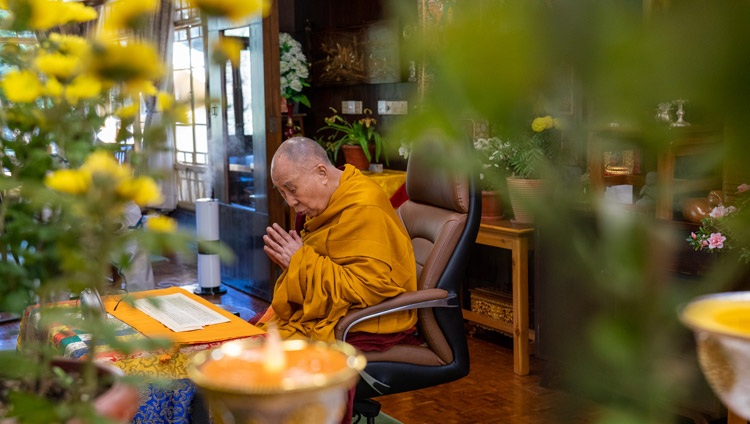
As he completed his reading, His Holiness informed his listeners that he received the transmission of this text from his tutor Kyabjé Trijang Rinpoché. It presents both the profound and extensive aspects of the path.
“Read it and reflect on it. What it reveals is bodhichitta and the view of emptiness. Bodhichitta counters the self-centred attitude. Emptiness counters our strong clinging to the objective existence of things. Bodhichitta is the best way to fulfil your own goal.”
The President of the Republic of Tuva, Mr Sholban Kara-ool opened the question and answer session. He told His Holiness that a newly constructed main Buddhist temple was nearing completion in Tuva. He asked him to give it a name and to explain what he considers the function of such institutions.
“The temple’s name will be Thupten Shedrup Ling,” His Holiness replied. “Thupten denotes the teaching of the Buddha and Shedrup Ling indicates a place where it is taught and practised. There are five major topics for study: The Middle Way View, the Perfection of Wisdom, Higher Knowledge, Monastic Discipline, as well as logic and epistemology.
“The Perfection of Wisdom lays out how to progress on the path, the three knowledges and so forth. The unique quality of what the Buddha taught is revealed in the explanation of the Middle Way. Indeed, the Perfection of Wisdom and the Middle Way are the main areas of study. If you uphold these, the intent of the name Thupten Shedrup Ling will have been fulfilled.
“You’ve invited me to visit Tuva to conduct the consecration, but now is not the time due to the threat of the covid pandemic. However, I am hoping to be able to visit Wu Tai Shan and if that materializes, I hope to be able to come to Tuva too. I’ll keep your request in mind.”
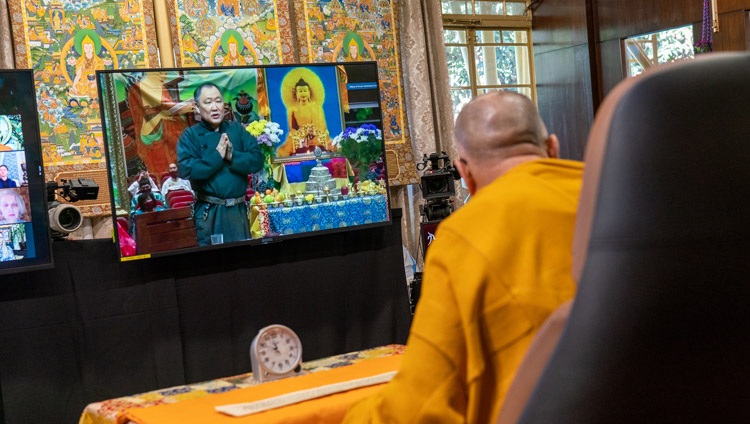
The newly enthroned Khamby Lama asked about teaching Buddhism in kindergartens and schools and His Holiness suggested that if a group were assembled from among Tuvans already studying in India, they could be provided with appropriate teacher training.
A Russian journalist wanted to know how we might transform ourselves and the world in these uncertain times. His Holiness agreed that the outbreak of the pandemic could be attributed in a general way to the ripening of negative karma. However, physicians and nurses are making efforts to care for the sick and researchers are working hard to find remedies. There is no need to feel discouraged.
He suggested that since the peoples of Kalmykia, Buryatia and Tuva are traditionally Buddhist, it would be good if they were to recite Tara’s mantra. He revealed that this is what he’s been doing every morning, praying for the pandemic to subside.
With regard to finding the discipline to allow people to develop a meditation practice, His Holiness recommended simply setting aside half an hour or an hour in the morning and again in the evening. He noted that early in the morning is good when the mind is fresh. It’s helpful to begin the day by cultivating a positive motivation. And if you can cultivate a sense of bodhichitta before you go to bed, your whole night’s sleep will be positive. When you eat it is beneficial to remember all those who have contributed to making food available to you.
His Holiness advised another questioner to examine whether she had recognised the object to be negated when meditating on emptiness. “When you understand emptiness properly,” he told her, “you’ll see how it supports altruism and helping others. You will also see how destructive emotions bring suffering. Having a sense of ‘I’ leads to attachment. It’s by clinging to things that we propel ourselves into cyclic existence.
“To rejuvenate your practice, don’t just follow a routine as you might follow a curriculum at school. Place your practice in a broader perspective and don’t just take things for granted.
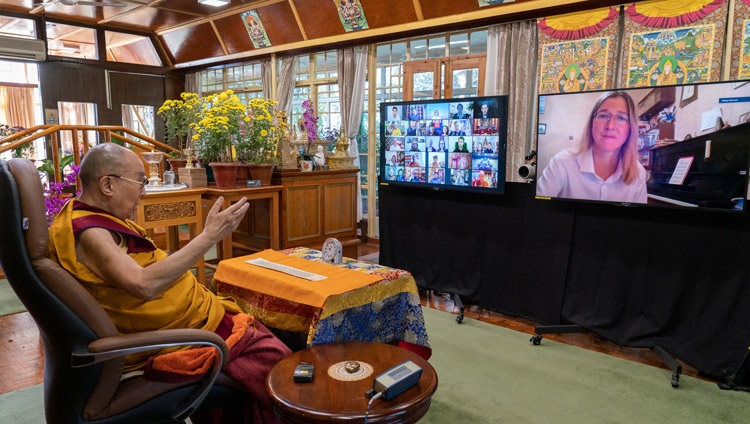
“We talk about establishing peace in the world, but people quarrel and of late have even fought and killed in the name of religion. By and large, the education system is inadequate. We teach about physical hygiene to preserve physical health, but too little is known about emotional hygiene, looking into what disturbs our minds. If you can cultivate an altruistic attitude, you’ll find peace of mind. With that you’ll create peace in your family and the wider community.”
His Holiness was asked about finding a guru and replied that it is not necessary to receive instruction from a living teacher to practise Buddhism. “What is important,” he said, “is to read appropriate books. If Shantideva’s ‘Guide to the Bodhisattva’s Way of Life’ is available in Russian, read that. It reveals the faults of the self-cherishing attitude and the advantages of cherishing others. Treat this book as your guru. When you’re angry, read chapter six. When you’re jealous, read chapter eight. Read it daily or whenever you can.
“When I lived in Lhasa, the ‘Stages of the Path’ texts were popular, but once I came into exile, I received an explanation of the ‘Guide’ from Khunu Lama Rinpoché and it has become the work I prefer to teach.”
Thanking His Holiness for his teaching and looking forward to seeing him again tomorrow, Natasha Inozemtseva brought today’s session to an end.
SOURCE: https://www.dalailama.com/news/2020/commentary-on-the-awakening-mind-second-day

